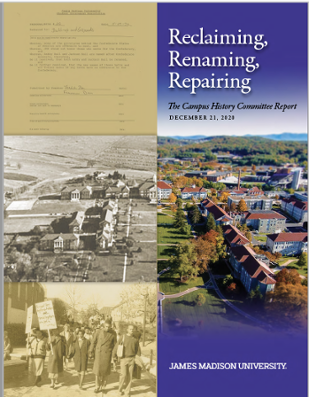 On Friday, Feb. 19, 2021, the university’s Board of Visitors voted to approve three new names for buildings on campus. This is the culmination of research, study, community consultation and open communication about progress toward renaming these prominent sites on the JMU Quad. Read more about the historic decision: “JMU leadership approves new names for three buildings on campus.”
On Friday, Feb. 19, 2021, the university’s Board of Visitors voted to approve three new names for buildings on campus. This is the culmination of research, study, community consultation and open communication about progress toward renaming these prominent sites on the JMU Quad. Read more about the historic decision: “JMU leadership approves new names for three buildings on campus.”
News coverage appeared in local media, as well as the Washington Post and in the United Kingdom's Independent.
On Dec. 21, 2020, the Campus History Committee submitted its 80-plus-page report to Jonathan R. Alger for him to review with the President’s Cabinet, including new naming recommendations, as well as other proposed campus commemorations and plans for additional research. Mr. Alger and the university's vice presidents sent their recommendations, largely based on the report, to the Board of Visitors for review and decision.
Members of the Campus History Committee submitted recommendations on behalf of a much larger group of faculty, staff, students, alumni, and community members. Proud of the work we accomplished while operating under a condensed timeline and in a global pandemic, we recognize that we have built on the work of many others, and we urge readers to consider this document an invitation to engage more deeply with institutional history as an effective tool for equity and inclusion.
“Reclaiming, Renaming, Repairing”
Commemoration Information Panel
(Originally presented live and recorded on Nov. 9, 2020)
Find out why commemorative namings are so important, particularly in supporting the broader work toward diversity, equity and inclusion at JMU. Hear more about the Campus History Committee’s charges and projects and the truth-telling/reparative approach the committee is using.
Moderators: Meg Mulrooney, Chair of the Campus History Committee and Assoc. Vice Provost for University Programs; Diane Phoenix-Neal, Asst. Professor of Music and member of Sisters in Session
Guest: Brent Lewis, Assoc. Vice President for Diversity, Equity and Inclusion
Panelists: Gianluca De Fazio, Assoc. Professor of Justice Studies and member of Faculty Senate; Christopher B. Jones (’00), Harrisonburg City Councilman; Norman Jones III, student representative to the JMU Board of Visitors; Spencer Law, JMU student; Diane Strawbridge (’80, ’20M), Executive Director for Student Access and Inclusion
JMU’s current commemorative landscape includes nearly 100 named buildings as well as many named rooms, spaces, roads, centers, and other elements. Many of the buildings were named decades ago. The committee’s analysis revealed that, of the named buildings and as of Nov. 12, 2020,
• a majority (37) recognize white men,
• 8 recognize white couples,
• 8 recognize white women, and
• 2 recognize Black men.
Criteria for the committee’s naming recommendations
JMU’s Campus History Committee wishes to use names and naming as a means of building a welcoming environment that projects our values for an inclusive, diverse and equitable society. These names should come out of a process by participants who have given serious consideration and scholarly research to identifying these names. The criteria used to identify the names to be considered for this honor should:
- Acknowledge extraordinary and/or trailblazing service to the university. The honor should be given to an individual, group or organization whose service to the university has positively changed the university, impacted the larger community, and brought national or international recognition to James Madison University. It should recognize first and founding organizers whose creations and developments have led the way for others, contributed significantly to an existing or new field of inquiry, or brought distinction to themselves by the excellence and longevity of their service.
- Recognize a valued association with the university. The honor should be given to an individual, group or organization that has a significant position in the university, has given outstanding philanthropic support to the university, or has been the recipient of honorary degrees, special commendations or awards. The naming should bring honor and distinction to the University because the honoree’s association will be lasting and consistent with the traditions and purposes of the University.
- Commemorate the contributions of significant historical figures whose lives impacted the local, regional, national or international community. The honor should be given to a well-known individual whose work shaped history for the good and left a lasting and honorable legacy that our student could use as models for their own lives.
- Recognize heretofore hidden figures who have made major contributions to the academic and/or local community. Because many of these individuals were invisible or ignored because of systemic racism or implicit bias, their contributions and achievements remained hidden or buried. Their inclusion in the naming process will signal our intention to not only reflect our time-honored traditions but also build a living, inclusive history.
- Acknowledge the principles of diversity, equity, and inclusion in making decisions about identifying potential honorees. We are called upon to create a commemorative landscape that better represents the diverse backgrounds of students, faculty, staff, community, and alumni by recognizing overlooked contributions to the campus and community, maintaining an inclusive naming and renaming process as part of the naming policy, and, in all ways, making the entire process transparent and meaningful for future generations who will join the JMU family.
Want to stay informed or get involved?
Choose any of the many ways to learn more and stay in touch with us for updates on our progress.
